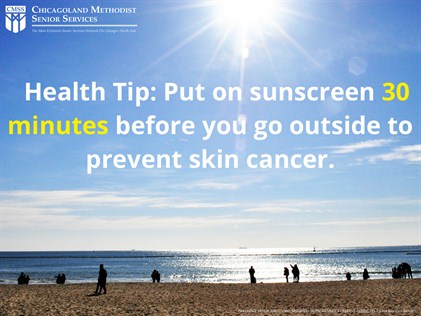Did you know that skin cancer is the most common form of cancer in the United States? And the main way of getting this disease is through ultraviolet rays from the sun. While a little Vitamin D from the sun is good for us, too much exposure can be extremely harmful to our bodies. In fact, one in five Americans will develop skin cancer in the course of their lifetime, so taking care of your skin is not something to take lightly.

Although outdoor activities are great for the body and mind, it’s important to keep your skin safe while enjoying them. Here are a few ways to protect your skin this summer:
-
Use sunscreen.
Sunscreen is key each and every day. Even if you’ll only be outside for an hour, you need the protection. Use an SPF of 15 or higher every day in order to ensure the best protection. SPF 15 effectively filters out about 93 percent of all incoming UVB rays, and higher SPFs will filter out even more. For the best protection, apply 30 minutes prior to being in the sun.
-
Seek the shade.
If you’re planning on being outside for a long time, find a place with shade. This is especially important between 10am and 4pm when the sun is at its strongest. Whether watching your grandkids baseball game or sitting outside on your deck, the shade is the safest place for you and your skin.
-
Cover up.
Clothing can be your best line of defense against skin cancer. Lightweight clothing, especially linen, is perfect for the summer heat. Long pants and long sleeved shirts will give you the best line of defense. Also, broad-brimmed hats and UV-blocking sunglasses are other essentials for protecting your skin this summer.
-
Do not burn.
While this may seem obvious, it’s important to not get a sunburn. With every sunburn, you increase your risk of developing melanoma, the deadliest form of skin cancer. Avoid sunburn by keeping your time in direct sunlight short and reapplying sunscreen every 2 hours.
-
Examine your skin.
To ensure you notice any changes in your skin that may be harmful, examine yourself from head to toe every day. Things to look for are spots or sores that itch, hurt or scab, a mole or brown spot that changes in texture, color or size or anything else unusual. If you notice anything concerning, contact your doctor immediately.
-
Have a yearly skin exam.
Most skin cancers are curable if caught early, so make a yearly appointment with your physician or dermatologist specifically to have a skin exam.
Incorporate these tips into your daily routine and your skin will thank you.
